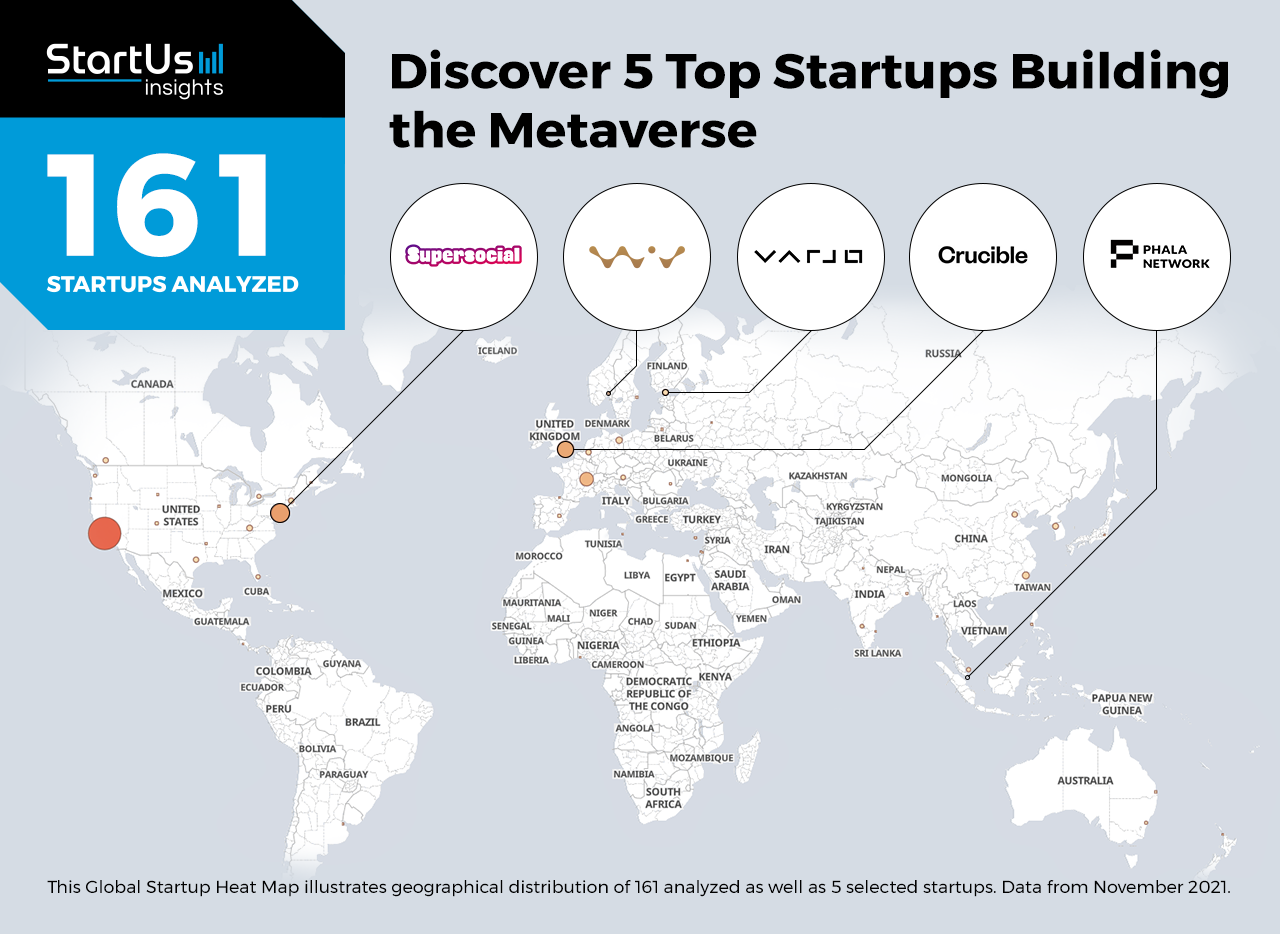Accelerate Productivity in 2025
Reignite Growth Despite the Global Slowdown
Staying ahead of the technology curve means strengthening your competitive advantage. That is why we give you data-driven innovation insights into the metaverse. This time, you get to discover 5 hand-picked startups building solutions for the metaverse.
Facebook recently rebranded itself as Meta to prepare for the next step in the evolution of online communities. Bringing together innovations from mixed reality, blockchain, and self-sovereign identity, the metaverse is an emerging concept for the future of the web. Think of trying products before purchasing, traveling around the world, or doing hands-on training, without ever leaving the room, thanks to hyperrealistic experiences. While Meta is one of the few large companies investing in the metaverse, dozens of startups globally are also reimagining the internet, and how users interact with it, with Web 3.0 and decentralized applications.
Out of 161, the Global Startup Heat Map highlights 5 Top Metaverse Startups
The insights of this data-driven analysis are derived from the Big Data & Artificial Intelligence-powered StartUs Insights Discovery Platform, covering 2 093 000+ startups & scaleups globally. The platform gives you an exhaustive overview of emerging technologies & relevant startups within a specific field in just a few clicks.
The Global Startup Heat Map below reveals the distribution of the 161 exemplary startups & scaleups we analyzed for this research. Further, it highlights 5 metaverse startups that we hand-picked based on criteria such as founding year, location, funding raised, and more. You get to explore the solutions of these 5 startups & scaleups in this report. For insights on the other 156 metaverse startups, get in touch.
Crucible enables the Open Metaverse
Founding Year: 2018
Location: London, UK
Partner for: WebVR, Digital Identities
British startup Crucible develops tools for an open metaverse. It provides self-sovereign, portable identities that allow players or creators to securely store all their digital assets in one place. Using WebVR, a framework that brings virtual reality to the web, creators can host walkthrough galleries showcasing digital art. Crucible’s solutions offer future-proof security while allowing users to be anonymous and retain accountability at the same time.
WiV offers Physical Non-Fungible Tokens (NFT)
Founding Year: 2017
Location: Oslo, Norway
Funding: USD 1,5 M
Partner for: NFTs, Asset Tokenization
WiV is a Norwegian startup that transforms investable wines into high-yielding NFTs. With advances in blockchain, collectors are looking for ways to tokenize their physical products, usually luxury goods, into physical NFTs. WiV does just that for collectors of expensive wine, providing them a borderless, fraud-proof community for trading. Its platform enables collectors to build digital wine cellars and show them to other collectors or buyers.
Varjo advances Virtual Spatial Collaboration
Founding Year: 2016
Location: Helsinki, Finland
Funding: USD 122,5 M
Partner for: Mixed Reality, Virtual Reality
Finnish startup Varjo develops immersive reality headsets for virtual spatial collaboration. Varjo XR-3, the startup’s prime headset, offers photorealistic visual fidelity across a wide field of view. It uses light detection and ranging (LiDAR) to perceive depth and construct a 3D world around the viewer. While collaborating, this makes remote participants feel like they are in the same space. The startup’s headsets find applications in training, simulation, engineering, and healthcare.
Supersocial creates Immersive Games
Founding Year: 2020
Location: New York, US
Funding: USD 7,1 M
Partner for: Game Development, Virtual Spaces
Supersocial is a US-based startup that is building immersive games and experiences. As the gaming communities were quick to adopt the underlying technologies, such as NFTs and virtual reality, the metaverse is taking gaming to the next level. This includes games that provide unique gameplay experiences across collective virtual spaces on the metaverse. Supersocial Labs, the startup’s community, enables Roblox game developers to create games for the metaverse.
Phala Network provides Confidential Smart Contracts
Founding Year: 2019
Location: Singapore
Partner for: Decentralized Finance (DeFi), Smart Contracts
Singaporean startup Phala Network offers confidential smart contracts. It leverages Polkadot, a blockchain interoperability protocol, to create a confidentiality layer for Web 3.0 developers. End-on-end encryption on the blockchain ensures high security while its heterogeneous architecture ensures the compostability of blockchains and contracts. The startup’s smart contracts find use in DeFi, healthcare data, and other decentralized applications (Dapps).
Discover more Metaverse startups
Startups such as the examples highlighted in this report focus on immersive reality, spatial collaboration, and immersive gaming. While all of these technologies play a major role in advancing the metaverse, they only represent the tip of the iceberg. To explore more metaverse technologies, simply get in touch to let us look into your areas of interest. For a more general overview, you can download one of our free Industry Innovation Reports to save your time and improve strategic decision-making.








